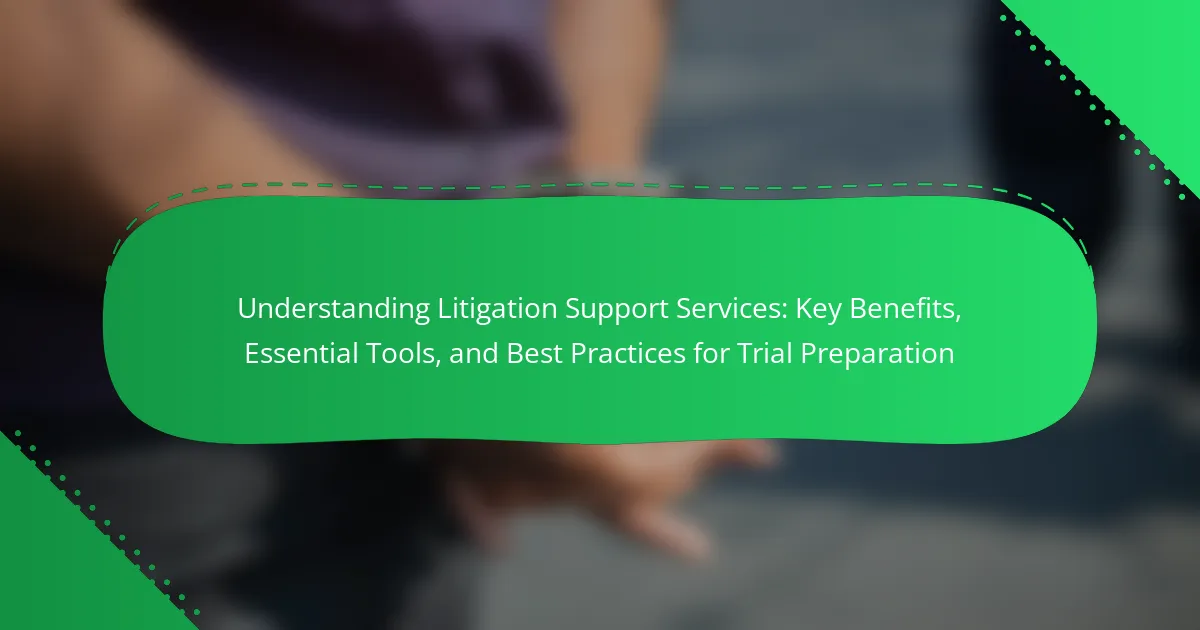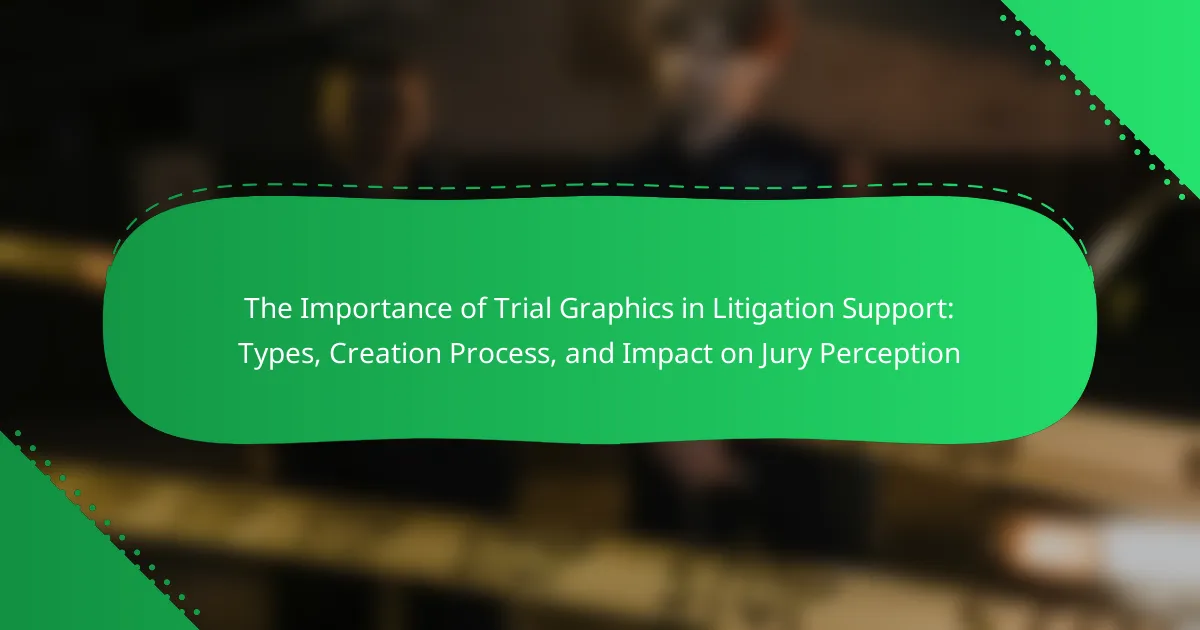Litigation support services are specialized offerings that aid legal professionals in efficiently managing cases through activities such as document management, electronic discovery, and trial preparation. These services enhance the litigation process by organizing relevant information and providing tools for data analysis and presentation, thereby improving the efficiency of legal proceedings. Essential tools include document management software, e-discovery tools, and trial presentation software, all of which facilitate accurate information handling and collaboration among legal teams. Best practices for utilizing litigation support services involve thorough planning, clear communication, and maintaining organized documentation, which collectively lead to improved case management and outcomes in litigation.

What are Litigation Support Services?
Litigation support services are specialized services that assist legal professionals in managing cases effectively. These services encompass a range of activities, including document management, electronic discovery, and trial preparation. Litigation support services help streamline the litigation process, ensuring that relevant information is organized and accessible. They also provide tools for data analysis and presentation, enhancing the overall efficiency of legal proceedings. The use of litigation support services has grown significantly, as they enable law firms to handle complex cases more effectively. According to a survey by the Legal Technology Resource Center, 50% of law firms report using some form of litigation support technology.
How do Litigation Support Services function in the legal process?
Litigation Support Services assist legal teams by providing essential resources and expertise during the legal process. These services include document management, legal research, and trial preparation support. They streamline the organization of case materials and ensure that relevant documents are easily accessible. Litigation support also involves data analysis and electronic discovery, which helps in identifying key evidence. By utilizing technology, these services enhance the efficiency of case handling. Legal professionals rely on litigation support to improve their case strategies and presentations. This reliance is evident as firms increasingly adopt these services to manage complex cases effectively.
What are the key components of Litigation Support Services?
The key components of Litigation Support Services include document management, electronic discovery, trial presentation, and expert witness services. Document management involves organizing and storing case-related documents efficiently. Electronic discovery encompasses the identification, collection, and analysis of electronically stored information. Trial presentation services focus on creating visual aids and demonstrative evidence for courtroom use. Expert witness services provide access to specialists who can offer testimony and insights on specific subjects relevant to the case. These components work together to enhance the effectiveness of legal teams during litigation processes.
How do these components interact during a trial?
During a trial, various components such as evidence presentation, witness testimony, and legal arguments interact dynamically. Evidence presentation involves displaying documents, exhibits, and multimedia to support claims. Witness testimony provides firsthand accounts that validate or challenge the evidence presented. Legal arguments synthesize both evidence and testimony to persuade the judge or jury.
These components work together to create a coherent narrative. The effectiveness of each component relies on the others for context and support. For instance, strong witness testimony can enhance the impact of presented evidence. Conversely, weak evidence can undermine even the most compelling testimony.
Legal strategies are developed based on the interaction of these components. Attorneys analyze how evidence and testimony align with legal precedents. This analysis informs their approach to questioning witnesses and presenting arguments. Overall, the interaction of these components is crucial for establishing a compelling case.
What are the primary benefits of Litigation Support Services?
Litigation Support Services provide essential assistance to legal professionals during trial preparation. They enhance case management by organizing documents and evidence efficiently. These services improve the accuracy of legal research, ensuring relevant information is readily available. They also facilitate effective communication among team members and clients. Additionally, Litigation Support Services offer technology solutions for data analysis and presentation. This leads to more persuasive arguments in court. According to a survey by the International Legal Technology Association, 75% of attorneys reported improved case outcomes with these services.
How do these services enhance trial preparation?
Litigation support services enhance trial preparation by providing essential tools and resources. These services streamline document management, ensuring easy access to critical evidence. They also offer expert analysis, helping legal teams understand complex data. Additionally, they facilitate effective communication among team members. This collaboration improves strategy development and case presentation. Furthermore, litigation support services often include technology solutions like e-discovery tools. These tools increase efficiency in gathering and reviewing evidence. Overall, the integration of these services leads to a more organized and effective trial process.
What cost savings can be achieved through effective Litigation Support Services?
Effective Litigation Support Services can achieve significant cost savings by streamlining case processes. These services reduce the time spent on document review and management. For instance, utilizing advanced e-discovery tools can lower costs by up to 30%.
Additionally, Litigation Support Services minimize the need for extensive personnel resources. By automating routine tasks, firms can allocate staff to more strategic roles. This reallocation can lead to further reductions in labor costs.
Moreover, these services enhance accuracy in data handling, which decreases the likelihood of costly mistakes. According to a study by the Association of Corporate Counsel, firms that implemented effective litigation support reported a 20% decrease in overall litigation expenses.
Overall, effective Litigation Support Services provide measurable cost savings through efficiency, resource optimization, and error reduction.

What essential tools are used in Litigation Support Services?
Essential tools used in Litigation Support Services include document management software, e-discovery tools, and trial presentation software. Document management software organizes and stores legal documents efficiently. E-discovery tools assist in searching and retrieving electronic evidence. Trial presentation software aids in displaying evidence during trials. These tools enhance accuracy and efficiency in legal proceedings. They streamline workflows and improve collaboration among legal teams. Their use is critical in managing large volumes of information. This ensures that all relevant data is accessible and well-presented in court.
What types of software are commonly utilized?
Commonly utilized software in litigation support includes case management systems, document management software, and e-discovery tools. Case management systems help organize case-related information efficiently. Document management software allows for the storage and retrieval of legal documents. E-discovery tools facilitate the identification and collection of electronically stored information. Additionally, trial presentation software is used to create visual aids for courtroom presentations. Legal research software assists attorneys in finding relevant case law and statutes. Each type of software enhances the efficiency and effectiveness of legal proceedings.
How do case management tools aid in trial preparation?
Case management tools aid in trial preparation by organizing case information efficiently. They centralize documents, evidence, and communications in one accessible platform. This organization allows legal teams to track deadlines and manage schedules effectively. Additionally, case management tools facilitate collaboration among team members. They enable quick sharing of updates and critical information. Many tools offer features like task assignment and progress tracking. This ensures all team members are aligned and accountable. Overall, these tools streamline workflows and enhance productivity during trial preparation.
What role does e-discovery software play in litigation?
E-discovery software facilitates the identification, collection, and analysis of electronic data in litigation. It streamlines the process of managing vast amounts of digital information. This software enables legal teams to search for relevant documents efficiently. It also assists in organizing data to meet legal requirements. E-discovery tools often include features for data filtering and keyword searching. They help reduce the time and costs associated with manual document review. According to a study by the RAND Corporation, e-discovery can lower litigation costs by up to 30%. Additionally, e-discovery software enhances compliance with legal standards for evidence handling.
How do technological advancements impact Litigation Support Services?
Technological advancements significantly enhance Litigation Support Services. They streamline document management and improve data analysis. Tools like e-discovery software automate the retrieval of relevant information. This reduces time and costs associated with manual searches. Advanced analytics help identify patterns in large data sets. This leads to more informed legal strategies. Cloud storage facilitates secure access to case files from anywhere. Real-time collaboration tools enhance communication among legal teams. Overall, technology increases efficiency and accuracy in litigation processes.
What emerging technologies are shaping the future of litigation support?
Artificial intelligence, cloud computing, and blockchain are emerging technologies shaping the future of litigation support. AI enhances document review and predictive analytics. Cloud computing allows for secure data storage and remote access. Blockchain ensures data integrity and transparency in case management. These technologies streamline processes and improve efficiency. Research shows that AI can reduce document review time by up to 80%. Cloud solutions are projected to grow by 22% annually in legal services. Blockchain applications in law are also increasing, with a focus on smart contracts. These advancements are transforming litigation support services significantly.
How can firms leverage technology for better outcomes?
Firms can leverage technology for better outcomes by implementing advanced litigation support tools. These tools enhance case management efficiency and improve collaboration among legal teams. For instance, document management systems streamline the organization of case files. E-discovery software accelerates the process of identifying relevant evidence. Additionally, case analytics tools provide insights into case strengths and weaknesses. Firms that adopt these technologies often see increased accuracy in legal research and reduced trial preparation time. According to a study by the American Bar Association, firms utilizing technology report a 30% increase in productivity. Therefore, leveraging technology is essential for achieving better outcomes in litigation.

What are the best practices for utilizing Litigation Support Services?
Best practices for utilizing Litigation Support Services include thorough planning and clear communication. Establish specific objectives for the litigation support needed. Identify the key processes and tools required for the case. Engage with experienced litigation support professionals early in the process. Maintain organized documentation throughout the case. Regularly review and assess the effectiveness of the support services used. Ensure compliance with legal standards and confidentiality requirements. Utilize technology to streamline processes and improve efficiency. These practices enhance case management and improve overall outcomes in litigation.
How can legal teams effectively integrate these services?
Legal teams can effectively integrate litigation support services by establishing clear communication protocols. This ensures that all team members understand the services available and their specific roles. Next, they should select appropriate technology tools that streamline case management and document sharing. Training sessions on these tools can enhance user proficiency and adoption. Regularly reviewing service integration can identify areas for improvement. Collaboration with external vendors can also provide specialized expertise. Data security measures must be prioritized to protect sensitive information. Finally, soliciting feedback from team members helps to refine the integration process.
What strategies ensure successful collaboration with litigation support providers?
Successful collaboration with litigation support providers requires clear communication and defined expectations. Establishing a detailed project scope is essential. This includes outlining roles, responsibilities, and timelines for all parties involved. Regular check-ins foster alignment and address any emerging issues promptly. Utilizing collaborative tools enhances real-time communication and document sharing. Providing feedback on deliverables helps refine processes and improve outcomes. Building a relationship based on trust and transparency is crucial for long-term success. Engaging in training sessions ensures that all team members are knowledgeable about the tools and processes used. These strategies collectively contribute to a more effective partnership with litigation support providers.
How can continuous improvement be achieved in the use of these services?
Continuous improvement in litigation support services can be achieved through regular assessment and feedback. Implementing a structured feedback loop allows for the identification of areas needing enhancement. Training staff on the latest technologies boosts efficiency and effectiveness. Utilizing data analytics can pinpoint trends and performance metrics. Regularly updating software and tools ensures that services remain current and effective. Engaging with clients for their insights fosters a collaborative improvement approach. Adopting best practices from industry benchmarks can elevate service quality. Continuous monitoring of service outcomes provides a basis for ongoing refinement.
What common challenges do legal teams face with Litigation Support Services?
Legal teams face several common challenges with Litigation Support Services. One challenge is managing large volumes of data. Legal cases often generate extensive documentation, making organization difficult. Another challenge is ensuring data accuracy and integrity. Errors in data can lead to significant legal repercussions. Additionally, legal teams struggle with technology adoption. Many team members may not be familiar with advanced litigation tools. Communication issues also arise, especially when coordinating with external vendors. Delays in receiving necessary support can impact case timelines. Lastly, budget constraints can limit the resources available for litigation support. These challenges can hinder the efficiency and effectiveness of legal teams in trial preparation.
How can these challenges be effectively addressed?
Challenges in litigation support services can be effectively addressed through strategic planning and the use of technology. Implementing case management software enhances organization and tracking of case documents. Regular training sessions for staff improve skills and knowledge about tools and processes. Collaborating with legal experts ensures that all aspects of the case are covered comprehensively. Utilizing cloud storage solutions provides secure and accessible document management. Establishing clear communication protocols fosters teamwork and reduces misunderstandings. Regularly reviewing and updating processes helps to adapt to changing legal requirements. These approaches enhance efficiency and effectiveness in trial preparation, leading to better outcomes.
What troubleshooting tips can enhance the use of Litigation Support Services?
To enhance the use of Litigation Support Services, implement a systematic approach to troubleshooting. Begin by clearly defining the specific issue encountered. Identify the software or tools in use and ensure they are updated to the latest versions. Check for compatibility issues between different systems or software. Verify data integrity by conducting routine audits of case files and documents. Establish clear communication channels among team members to facilitate quick resolution of problems. Utilize training resources and user manuals for guidance on software features. Engage with technical support from service providers when complex issues arise. Document all troubleshooting steps and resolutions for future reference.
Litigation Support Services are specialized resources that assist legal professionals in managing cases effectively through activities such as document management, electronic discovery, and trial preparation. The article outlines the key components of these services, their functions in the legal process, and the benefits they provide, including improved case management and cost savings. It also discusses essential tools used in litigation support, such as document management and e-discovery software, and emphasizes best practices for integrating these services into legal workflows. Additionally, the article addresses common challenges faced by legal teams and offers strategies for overcoming them to enhance trial preparation and outcomes.



